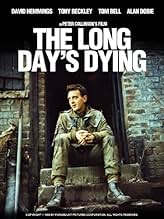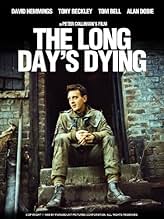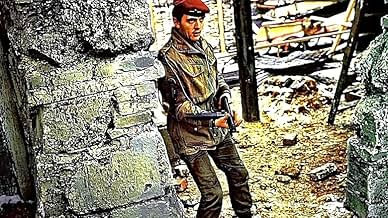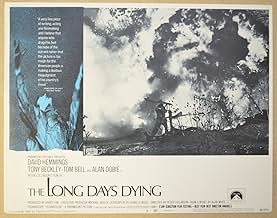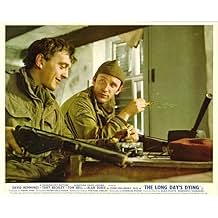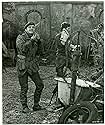IMDb RATING
6.5/10
550
YOUR RATING
The saga of three British soldiers and their German captive as they trek through the European countryside.The saga of three British soldiers and their German captive as they trek through the European countryside.The saga of three British soldiers and their German captive as they trek through the European countryside.
- Awards
- 2 wins total
- Director
- Writers
- All cast & crew
- Production, box office & more at IMDbPro
Featured reviews
It's hard for me to assign the "fair" number of stars to this film, but I settled on 8 because of its high production values and what was, in 1968, an innovative approach to the war film. Remember too that I haven't seen it since 1969. But it did make a strong impression.
The Long Day's Dying must be one of the most vivid antiwar films ever made. It achieves this simply by portraying in extremely realistic terms the actions of a handful of soldiers in Northwestern Europe in 1944-45. No film before this one showed war at the infantry squad level with so much brutal detail, and all in a coldly dispassionate way that lets the actions speak for themselves. There is no preaching, no sentimentality, no comic relief, no complicated scenarios.
Unfortunately, there's no subtlety either. Partly because of their situation - trying to stay alive - the characters come across as flat, familiar cliché's. As "entertainment," the film doesn't make it, though it was clearly not intended to "entertain." It was intended to slug you over the head with the misery and horror of World War II and modern war in general. This was twenty years before Platoon and thirty before Saving Private Ryan, both of which are far more "watchable" films. Here the flat and generally disagreeable characters, the lack of an actual plot, and the realistically unpleasant images (including what may be the first on-screen vomit in theatrical history) make the film hard to sit through, though it is only 95 minutes.
So, 10 stars for production and realism, 4 stars for the feeling you'll have when it's over, a bonus star for having its heart in the right place. Average: 8.
Like Carl Foreman's underrated "The Victors," an equally downbeat but more interesting and thought-provoking film, The Long Day's Dying seems not to be on DVD. Why not? Both films have been on cable a number of times.
The Long Day's Dying must be one of the most vivid antiwar films ever made. It achieves this simply by portraying in extremely realistic terms the actions of a handful of soldiers in Northwestern Europe in 1944-45. No film before this one showed war at the infantry squad level with so much brutal detail, and all in a coldly dispassionate way that lets the actions speak for themselves. There is no preaching, no sentimentality, no comic relief, no complicated scenarios.
Unfortunately, there's no subtlety either. Partly because of their situation - trying to stay alive - the characters come across as flat, familiar cliché's. As "entertainment," the film doesn't make it, though it was clearly not intended to "entertain." It was intended to slug you over the head with the misery and horror of World War II and modern war in general. This was twenty years before Platoon and thirty before Saving Private Ryan, both of which are far more "watchable" films. Here the flat and generally disagreeable characters, the lack of an actual plot, and the realistically unpleasant images (including what may be the first on-screen vomit in theatrical history) make the film hard to sit through, though it is only 95 minutes.
So, 10 stars for production and realism, 4 stars for the feeling you'll have when it's over, a bonus star for having its heart in the right place. Average: 8.
Like Carl Foreman's underrated "The Victors," an equally downbeat but more interesting and thought-provoking film, The Long Day's Dying seems not to be on DVD. Why not? Both films have been on cable a number of times.
This movie depicts the fact that war has its own morality. It shows how enemy soldiers, when removed from the context of war, simply become human beings sharing common goals of survival. However, when they are placed back into war, they become deadly enemies again. These two scenarios(sharing common goals, and then attempting to kill each other), while diametrically opposed, morally speaking, are actually both moral in their own context. I feel that this is an excellent anti-war movie which attempts to show that war is a disease of humanity. When it occurs, it needs to be eliminated with the minimum effect on surrounding tissue(humanity) as soon as possible while trying to assure that it does not return.
Surprise, it was released on Historia (French counterpart of the History Channel) Of course it was dubbed in French, but it did not lose any of its suspense, almost claustrophobic atmosphere. The paratroopers were third-dimensional in character and even the German prisoner seemed believable ! Not the all good for our side and all bad for the enemy kind of script ! Excellent ! Would compete well with today's movies like Pearl Harbour, etc. etc. !
I saw the long day's dying when it first came out at the cinema, I thought the film gave a good soldiers point of view, it gave a realistic account, of men at war. The storyline moves at a nice pace, showing a group of men behind enemy lines, and trying to return back to their own lines with an enemy prisoner. The characters are well developed, and believable.
David Hemmings is a good actor and plays the leading role with conviction, as does Alan Dobie (as German Helmut) I was surprised, that i have been unable to find this film on VHS or DVD, and I feel it has become the forgotten film, which is sad , as it is superior to many other war films I have seen.
David Hemmings is a good actor and plays the leading role with conviction, as does Alan Dobie (as German Helmut) I was surprised, that i have been unable to find this film on VHS or DVD, and I feel it has become the forgotten film, which is sad , as it is superior to many other war films I have seen.
In his third film, director Peter Collinson gives us this very unusual antiwar offering. A lost film that is very rarely screened nowadays, and completely unavailable on video or DVD, The Long Day's Dying is one of those movies that divides the majority of viewers into two camps - there are those who hail it as a cult classic and a film of tremendous power, and there are those who find it irritating and unappealing in the extreme. One of the most experimental things Collinson has done in this film is to use very little spoken dialogue; instead most of the talk is provided by voice-overs telling us what is going through a character's mind at a given moment. So, for example, when David Hemmings is creeping up behind a German soldier but cannot bring himself to cold-bloodedly shoot the man in the back, his thoughts are heard in voice-over as he thinks: "You're dead and you don't even know it. Now turn around. TURN AROUND!"
Three British paratroopers find themselves stranded in a deserted building somewhere in the European countryside during WWII. We learn that they were instructed to hide in the building and keep watch for advancing Germans, with a promise from their sergeant that he would return for them later to take them back to the rest of their unit. The trio consists of pacifist John (David Hemmings), violent Cliff (Tony Beckley) and the quiet but clear-thinking Tom (Tom Bell). However, several hours have gone by since the sergeant was supposed to relieve them, and the three are now beginning to grow anxious. Their plight worsens when a three-man German patrol happens by. The British paratroopers kill two of the Germans but the third - Helmut (Alan Dobie) - is only injured and becomes their prisoner. Now that their location is compromised the trio decide that their safest bet is to find their unit by themselves, so they set off with their prisoner on a trek through the countryside in search of their allies....
The Long Day's Dying is full of quiet understatement, with many moments where the camera lingers long on the faces of the protagonists. Even a small grin, a frown, or a hard swallow is very deliberate and is meant to be significant. The actors do a good job at getting across these subtle, almost imperceptible emotions. The story itself is rather dull, with little taking place over the 95 minute running time. One assumes that the film is some kind of allegory, with the handful of characters used as a microcosm - a small-scale representation, if you like - of the wider picture that was the Second World War. The violence is infrequent, but when they come the scenes of death and injury are very gory and show with grim realism the terrible things that weapons and booby traps can do to the human body. I found The Long Day's Dying a bit disappointing, as I couldn't get past the allegorical pretensions and the relentlessly unorthodox approach. But I certainly wouldn't pan it in the way that most professional critics have (Variety, Halliwell, Maltin, et al all hated this film). It's an unusual and very different sort of war film that some viewers - (admittedly, I'm not one of them) - will find interesting, powerful and thought-provoking.
Three British paratroopers find themselves stranded in a deserted building somewhere in the European countryside during WWII. We learn that they were instructed to hide in the building and keep watch for advancing Germans, with a promise from their sergeant that he would return for them later to take them back to the rest of their unit. The trio consists of pacifist John (David Hemmings), violent Cliff (Tony Beckley) and the quiet but clear-thinking Tom (Tom Bell). However, several hours have gone by since the sergeant was supposed to relieve them, and the three are now beginning to grow anxious. Their plight worsens when a three-man German patrol happens by. The British paratroopers kill two of the Germans but the third - Helmut (Alan Dobie) - is only injured and becomes their prisoner. Now that their location is compromised the trio decide that their safest bet is to find their unit by themselves, so they set off with their prisoner on a trek through the countryside in search of their allies....
The Long Day's Dying is full of quiet understatement, with many moments where the camera lingers long on the faces of the protagonists. Even a small grin, a frown, or a hard swallow is very deliberate and is meant to be significant. The actors do a good job at getting across these subtle, almost imperceptible emotions. The story itself is rather dull, with little taking place over the 95 minute running time. One assumes that the film is some kind of allegory, with the handful of characters used as a microcosm - a small-scale representation, if you like - of the wider picture that was the Second World War. The violence is infrequent, but when they come the scenes of death and injury are very gory and show with grim realism the terrible things that weapons and booby traps can do to the human body. I found The Long Day's Dying a bit disappointing, as I couldn't get past the allegorical pretensions and the relentlessly unorthodox approach. But I certainly wouldn't pan it in the way that most professional critics have (Variety, Halliwell, Maltin, et al all hated this film). It's an unusual and very different sort of war film that some viewers - (admittedly, I'm not one of them) - will find interesting, powerful and thought-provoking.
Did you know
- TriviaThis was produced on a deceptively low budget. Prodicer Michael Deeley on his memoirs says that it cost between £150,000 and £200,000.
- ConnectionsReferenced in The Making of 'The Italian Job' (2003)
Details
- Release date
- Country of origin
- Language
- Also known as
- Le commando des maudits
- Filming locations
- Production company
- See more company credits at IMDbPro
- Runtime
- 1h 35m(95 min)
- Sound mix
- Aspect ratio
- 2.35 : 1
Contribute to this page
Suggest an edit or add missing content

